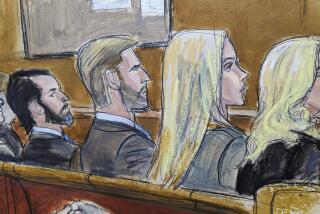Letter of the Law: Court Says Vanna’s Fame Is Her Fortune : Publicity: Justices let stand ruling that the game show hostess has sole right to profit from her identity. Electronics firm said use was protected as parody.
- Share via
WASHINGTON — In a case that expands a celebrity’s right to profit from her image, the Supreme Court cleared the way Tuesday for TV game show hostess Vanna White to seek damages for an advertisement that showed a futuristic female robot turning the letters on a game show board.
Without dissent, the justices refused to hear an appeal from the ad’s sponsor, Samsung Electronics, which argued that it had a free speech right to parody the celebrity’s image.
Instead, the high court let stand a 2-1 ruling by a federal appeals court in California that had decreed “the law protects the celebrity’s sole right to exploit this value (of) a celebrity identity . . . whether the celebrity has achieved this fame out of rare ability, dumb luck or a combination thereof.”
The case now returns to a federal courtroom in Los Angeles, where a jury will be asked to decide whether the Samsung ad indeed depicts White.
The case illustrates the evolving legal concept of a “right of publicity.” It had long been clear that a celebrity had a right to prevent her face or name from being used in an ad without permission. But in recent rulings, the courts have expanded this right to protect the celebrity’s power to control the use of her image.
In this case, Samsung, a South Korean electronics manufacturer, sought to promote the long life of its products by spoofing scenes from the 21st Century. One entitled “Longest Running Game Show, 2012 A.D.,” depicted a robot in a wig, gown and jewelry that resembled White in her role on TV’s “Wheel of Fortune.”
The actress had neither consented to the ads nor been paid for them, and filed a damage suit against Samsung and the ad firm of David Deutsch Associates for wrongly misappropriating her image. Initially, U.S. District Judge Ronald Lew in Los Angeles dismissed the case for failing to state a legal claim.
In August, however, the U.S. 9th Circuit Court revived the suit and ruled that the ad’s makers may have violated the law by “attempting to capitalize on White’s fame to enhance their fortune.”
Its opinion cited this hypothetical example. Suppose an ad “depicts a mechanical robot with male features, an African-American complexion and a bald head (shown) dunking a basketball one-handed, stiff-armed, legs extending like open scissors and tongue hanging out.” Even if neither name, uniform nor number were shown, wrote Judge Alfred Goodwin, it would nonetheless be clear the ad was depicting Chicago Bulls star Michael Jordan.
“This is a fairly new concept in the law, but this (decision) seems to broaden it somewhat,” said Larry Bumgardner, a Pepperdine University professor of communications law. “This (ad) is not Vanna White, but it conjures up her identity.”
The Supreme Court in 1977 first recognized the “right to publicity” when it upheld a damage claim against a television station that broadcast the entire act of a “human cannonball,” thereby robbing him of the benefit of his performance through ticket sales.
Recently, however, the California-based 9th Circuit Court has led the way in expanding and clarifying the notion. In 1988, for example, the appeals court ruled that singer Bette Midler could win damages for an ad that used a voice intended to sound like hers.
But the White case prompted a dispute within the 9th Circuit over whether an overly broad definition of a “right to publicity” infringes on the free speech rights of others.
Writing in dissent, Judge Arthur Alarcon said that the Samsung ad showed a “lifeless robot,” not a direct likeness of White. “Under the majority’s view of the law, Gene Autry could have brought an action against all other singing cowboys. Sylvester Stallone could sue actors who play blue-collar boxers.”
While the high court refused to hear the appeal in the case (Samsung vs. White, 92-1629), the justices could consider the issue later after a jury decides whether damages are appropriate.
In other actions, the court:
* Ruled, 6-3, that a drug dealer who “uses” a gun as barter during a drug transaction can be sentenced to a longer prison term (Smith vs. United States, 91-8674). The law imposes the stiffer penalty for the use of a gun during a crime and the majority said that the word “uses” is not limited to employing it as a weapon.
* Ruled that homeowners cannot use a bankruptcy court to reduce an outstanding mortgage to the shrinking value of their home (Nobelman vs. American Savings Bank, 92-641). On a 9-0 vote, the court said that the law gives mortgage lenders a clear right to repayment of the entire loan.
* Refused to hear an Illinois atheist’s complaint that the public schools violated his religious rights through a daily recitation of the Pledge of Allegiance to “one nation under God” (Sherman vs. Community Consolidated School District, 92-1377). An appeals court in Chicago noted that the law does not require all students to say the pledge.
* Left intact a federal appeals court ruling in a Kansas gay rights case that a local community’s “moral opposition to homosexuality” is reason enough for school officials to refuse to hire a teacher they believe to be gay. The case (Jantz vs. Muci, Cleofas, 92-1745) involved Vernon R. Jantz, a Wichita, Kan., substitute teacher who was denied a full-time high school teaching job because the principal thought he had “homosexual tendencies.”
More to Read
Inside the business of entertainment
The Wide Shot brings you news, analysis and insights on everything from streaming wars to production — and what it all means for the future.
You may occasionally receive promotional content from the Los Angeles Times.











